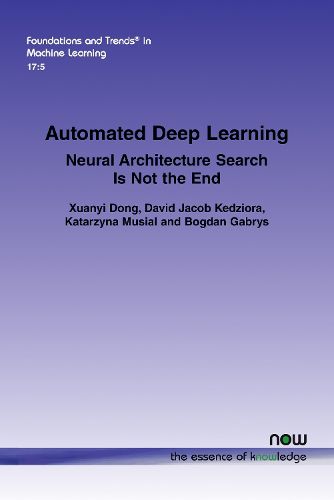Readings Newsletter
Become a Readings Member to make your shopping experience even easier.
Sign in or sign up for free!
You’re not far away from qualifying for FREE standard shipping within Australia
You’ve qualified for FREE standard shipping within Australia
The cart is loading…






This title is printed to order. This book may have been self-published. If so, we cannot guarantee the quality of the content. In the main most books will have gone through the editing process however some may not. We therefore suggest that you be aware of this before ordering this book. If in doubt check either the author or publisher’s details as we are unable to accept any returns unless they are faulty. Please contact us if you have any questions.
Deep learning (DL) has proven to be a highly effective approach for developing models in diverse contexts, including visual perception, speech recognition, and machine translation. Automated deep learning (AutoDL) endeavours to minimize the need for human involvement and is best known for its achievements in neural architecture search (NAS).
In this monograph, the authors examine research efforts into automation across the entirety of an archetypal DL workflow. In so doing, they propose a comprehensive set of ten criteria by which to assess existing work in both individual publications and broader research areas, namely novelty, solution quality, efficiency, stability, interpretability, reproducibility, engineering quality, scalability, generalizability, and eco-friendliness.
Aimed at students and researchers, this monograph provides an evaluative overview of AutoDL in the early 2020s, identifying where future opportunities for progress may exist.
$9.00 standard shipping within Australia
FREE standard shipping within Australia for orders over $100.00
Express & International shipping calculated at checkout
This title is printed to order. This book may have been self-published. If so, we cannot guarantee the quality of the content. In the main most books will have gone through the editing process however some may not. We therefore suggest that you be aware of this before ordering this book. If in doubt check either the author or publisher’s details as we are unable to accept any returns unless they are faulty. Please contact us if you have any questions.
Deep learning (DL) has proven to be a highly effective approach for developing models in diverse contexts, including visual perception, speech recognition, and machine translation. Automated deep learning (AutoDL) endeavours to minimize the need for human involvement and is best known for its achievements in neural architecture search (NAS).
In this monograph, the authors examine research efforts into automation across the entirety of an archetypal DL workflow. In so doing, they propose a comprehensive set of ten criteria by which to assess existing work in both individual publications and broader research areas, namely novelty, solution quality, efficiency, stability, interpretability, reproducibility, engineering quality, scalability, generalizability, and eco-friendliness.
Aimed at students and researchers, this monograph provides an evaluative overview of AutoDL in the early 2020s, identifying where future opportunities for progress may exist.